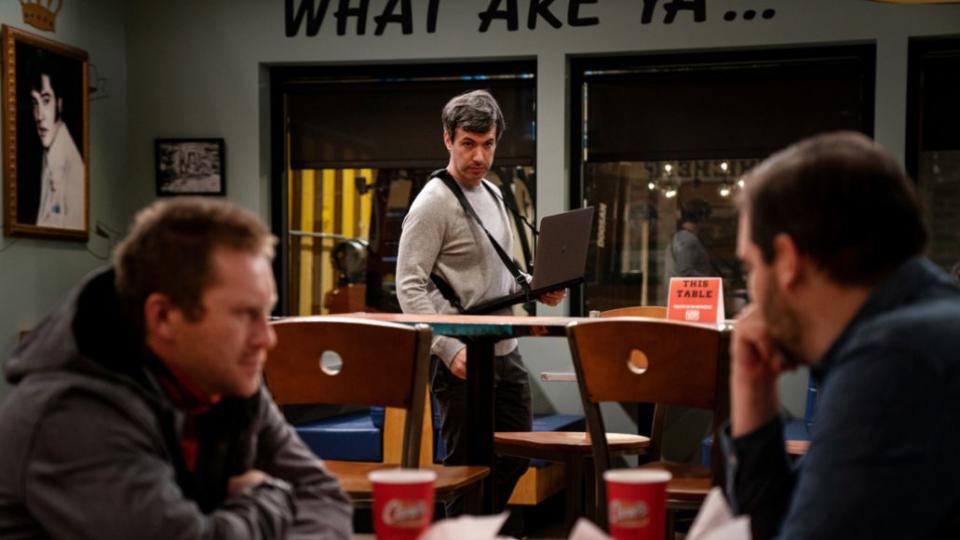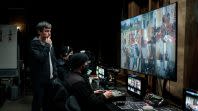How Nathan Fielder’s The Rehearsal Affirms My Experience with Autism
- Oops!Something went wrong.Please try again later.
The post How Nathan Fielder’s The Rehearsal Affirms My Experience with Autism appeared first on Consequence.
In a 2017 Rolling Stone profile, comedian Nathan Fielder discussed researching Asperger’s syndrome to shape his character on the popular Comedy Central program Nathan For You. Although Fielder did not disclose that he personally identifies on the autism spectrum, his latest project — HBO’s fascinating and deceptively moving docu-comedy The Rehearsal — reflects an experience that many autistic individuals such as myself have dealt with: masking, a survival mechanism in which autistic individuals suppress their neurodivergent traits in order to adapt to their surroundings.
The Rehearsal initially follows Fielder helping people practice difficult conversations and momentous life events by designing intricate simulations for them. To do this, he hires actors to inhabit these sets, and crafts dialogue trees in order to prepare his subjects for living out a future encounter or a significant milestone. These controlled environments essentially guide people to avoid mistakes with real consequences, while maintaining an illusion of verisimilitude.
Fielder also participates in The Rehearsal himself and as he becomes more and more entrenched in this convoluted orchestration, the series gradually shifts its focus more toward his dilemma with interpersonal ineptitude. Case in point: In Episode 1, Fielder calculates the most optimal way to socialize with his first client by constructing a replica of the client’s house to rehearse potential small talk, clever quips, and body movements with a stand-in.
His subtle deception works at first, but after telling an off-color joke and sitting in a chair at an uncomfortably low angle, Fielder worries about the uneven social dynamic between him and the client and that the joke came off more as a criticism. Watching that moment almost felt like a direct adaptation from my own memories of trying to navigate precarious social terrain while dealing with and hiding my autism.
Though neurological disability and social awkwardness aren’t necessarily mutually exclusive, The Rehearsal captures how autistic and other neurodivergent folks are conditioned to interact with the world around them. To paraphrase an observational tweet on the matter, Fielder dramatizes the anxieties that many individuals with autism face in the pursuit to belong, by breaking down the cultural norms that uphold and reward neurotypical behavior, ultimately revealing their inanity and futility.

The Rehearsal (HBO)
Speaking as someone who is autistic and has an extensive history with masking, I find The Rehearsal a deeply affirming watch. Seeing Fielder as both architect and subject of this social experiment reminded me of the 10+ years I spent in speech and language therapy, where I learned to develop critical thinking skills, study body language, read social cues, and communicate ideas in a thoughtful and succinct manner. Basically, I spent the majority of my childhood and adolescence rehearsing for all different kinds of scenarios, especially ones that involved conflict and confrontation like in The Rehearsal.
From preschool to eighth grade, speech and language therapy thoroughly prepared me on how to appropriately greet people, actively listen and engage in conversation, and express anger without resorting to rage during moments of frustration. Although I’m grateful for the many professionals who provided me with an instrumental toolkit for my emotional management, they also radically altered how I saw myself in relation to other people: someone who needed to be trained and tamed in order to be successful and well-liked.
Consequently, the constant cyclical stream of constructive feedback and self-interrogation created a lingering angst and a whole batch of insecurities around whether or not I could be my true self around people. I knew that I was curbing certain behaviors seen as socially inappropriate, like monologuing or impulsive bluntness, so that I could be embraced by my peers and the world at large.
Despite this, I wrestled with how often I was mirroring and mimicking people around me in order to blend in and how that made me feel like an imposter, how frequently I was adhering to other people’s needs rather than attending to and advocating for my own. Even now, I still have an urge to fixate on past faux pas and rigorously run through potential conversations by myself to avoid any potential disappointment, embarrassment, or incoherence.
Masking is essentially what each person in The Rehearsal is asked to do: act out social scripts and embody certain roles over and over again, to create a better sense of predictability and eliminate as much collateral damage as possible.
The Rehearsal’s Season Finale May Be Nathan Fielder’s Apology to the Past
Because we live in such a conflict-averse, results-oriented culture, Fielder’s unconventional approach can be both a comforting and healing frame of reference for anyone who fears rejection and failure and struggles to articulate their feelings. But because the real world is not tailored for predictable outcomes, when our reality doesn’t align with our expectations this method of camoflauging can also prove to be extremely disorienting and painful.
That tricky tightrope walk is exemplified in The Rehearsal’s first episode, where Kor Skeete, a New York-based trivia obsessive, asks Fielder to guide him through the process of confessing a long-held secret to his friend that could potentially end their relationship. Together, they map out every single possible factor that could occur from telling this secret, going so far as to construct an uncanny copy of the bar Skeete and his friend frequent to better choreograph his delivery of the news.
All goes well, thankfully, but Fielder expresses guilt for tricking Skeete into winning the trivia game by subtly feeding him the correct answers during their time together, so that the blow of the secret wouldn’t be as harsh. Fielder even rehearses divulging his secret with the Skeete stand-in from earlier in the episode, in order to face the potential emotional blowback for lying. The real Skeete is more understanding than the fake one, but throughout the rest of The Rehearsal, Fielder and his clients continue to come up against the discomfort of immersing themselves in fake situations that require real vulnerability.
In Episode 2, the devout Angela commits to simulating domesticity, playing mom to a rotating group of child actors. But after Robbin, a man Angela briefly dates, decides he cannot practice fatherhood with her and Fielder steps in to be her non-romantic co-parent, Angela becomes disinterested in the performance and less inclined to suspend her disbelief. During the rest of her multiple episode arc, she grows alienated and disillusioned by Fielder’s presence, noting how the simulation is becoming more about his journey than her own and subsequently leaves the production on her own volition.
Later, in Episode 3, a man named Patrick experiences a breakthrough in rehearsing a conversation over his grandfather’s will with an actor playing his brother. But when he’s called to do the actual heart-to-heart, Patrick disappears, likely overwhelmed from the emotional rawness of his performance.
Frustrated with and confused by these results, Fielder decides to unspool his already labryrithine premise even more by literally putting himself in his clients’ shoes. In Episode 4, Fielder strives to understand the psychology of Thomas, one of his “Fielder Method” students who expressed doubt around his class, by staging an exact reenactment of the course and attending it as Thomas.
He again creates a rehearsal for himself in Episode 6 when Remy, a young boy acting as Fielder’s “son,” believes Fielder to actually be his real father, refusing to call him by his name and only referring to him as “daddy.” Fielder dresses up as Remy’s mother, right down to her leather jacket and hand tattoo, and recreates their experience together with other actors to see if he could have done something differently to prevent Remy’s emotional attachment to him.
By stepping outside of his own mind and body, Fielder is able to better empathize with others, but loses sight of himself in the process. His predicament presents a pretty ethically thorny paradox: Is it possible to have meaningful, organic experiences and arrive at our true, authentic selves, even if it’s under the artifice of masking and performance?

The Rehearsal (HBO)
To me, The Rehearsal effectively gets at the root of this sticky contradiction. Being the creative puppeteer of this operation gives Fielder power over every single variable and their expected outcomes, a way to play God (or Willy Wonka, as Skeete puts it) in order to protect Fielder from any loss or grief he might encounter.
But since masking is inherently an unnatural, deceptive, and oppressive agent of conformity, that power simultaneously distances Fielder from ever becoming fully emotionally invested in whatever mindset he’s trying to hack.
Once Fielder eventually surrenders that power and embraces the messiness of his actions and the nuances of his consequences, he remains relatively unscathed, even somewhat relieved. He reaches the ultimate conclusion that there’s no perfect way to create the “right” experience or get the “correct” reaction, no matter how premeditated the approach.
If anything, The Rehearsal displays the impossibility of applying our culture’s one-size-fits-all social logic to everyday experiences. More often than not, the situations like the ones Fielder puts himself in only seem daunting and stressful because our culture does not value compassion, only flawlessness. This inevitably normalizes a very narrow idea of what a favorable outcome is supposed to look like.
It’s so immensely satisfying to see an acclaimed piece of media not only question the validity of this social logic, but also showcase the exhaustion of keeping up with it, especially for autistic people and other disabled folks who fear acting on their desires in a system that sets them up to fail.
It’ll be interesting to see where The Rehearsal goes in its second season and what other emotionally squirm-inducing scenarios it will explore (a Fielder family gathering, perhaps?) that could further point to the ineffective and unsustainable nature of masking. Given the first season’s lightning success, I’d be curious if these experiments could actually create material impact beyond funny, insightful entertainment — if it can actually help viewers build stronger communication in their own lives rather than just watch them play out on TV.
I don’t know if I would be where I am today without speech and language therapy. It haunts me, honestly, to think that I probably wouldn’t have the relationships or career path I have now were it not for my early behavioral intervention. But by having this meta-cognitive awareness around my autism, I can appreciate the help I received while recognizing autism as a vital part of my identity and acknowledging my limitations rather than suppressing them.
That moment of Fielder trying to make a good first impression on Kor is something most of us can relate to. But through a lens of disability, it speaks to the loneliness of how masking deprives autistic people of our humanity, of not being afforded the space for awkwardness and messiness in order to make other, more neurotypical, people feel comfortable and secure.
Disabled or not, people are awkward and messy and say and do the wrong thing all the time. That’s what being human is. The Rehearsal recognizes that, while also acknowledging that getting and giving support to learn from our mistakes is essential to our personal development. Without clarity and precision, there’s risk, but with risk comes joy and catharsis.
How Nathan Fielder’s The Rehearsal Affirms My Experience with Autism
Sam Rosenberg
Popular Posts
Rob Schneider Says Kate McKinnon Singing "Hallelujah" Was the Moment He Knew SNL Was "Over"
Neurosis Singer Scott Kelly Admits to Abuse, Announces Retirement from Music
Sylvester Stallone's Wife Filed for Divorce Because He Wanted Another Dog: Report
MTV Censored Måneskin's VMAs Performance After Victoria De Angelis' Top Fell Off
Gary Busey Pulls Pants Down in Public a Day After Being Charged with Multiple Sexual Offenses


